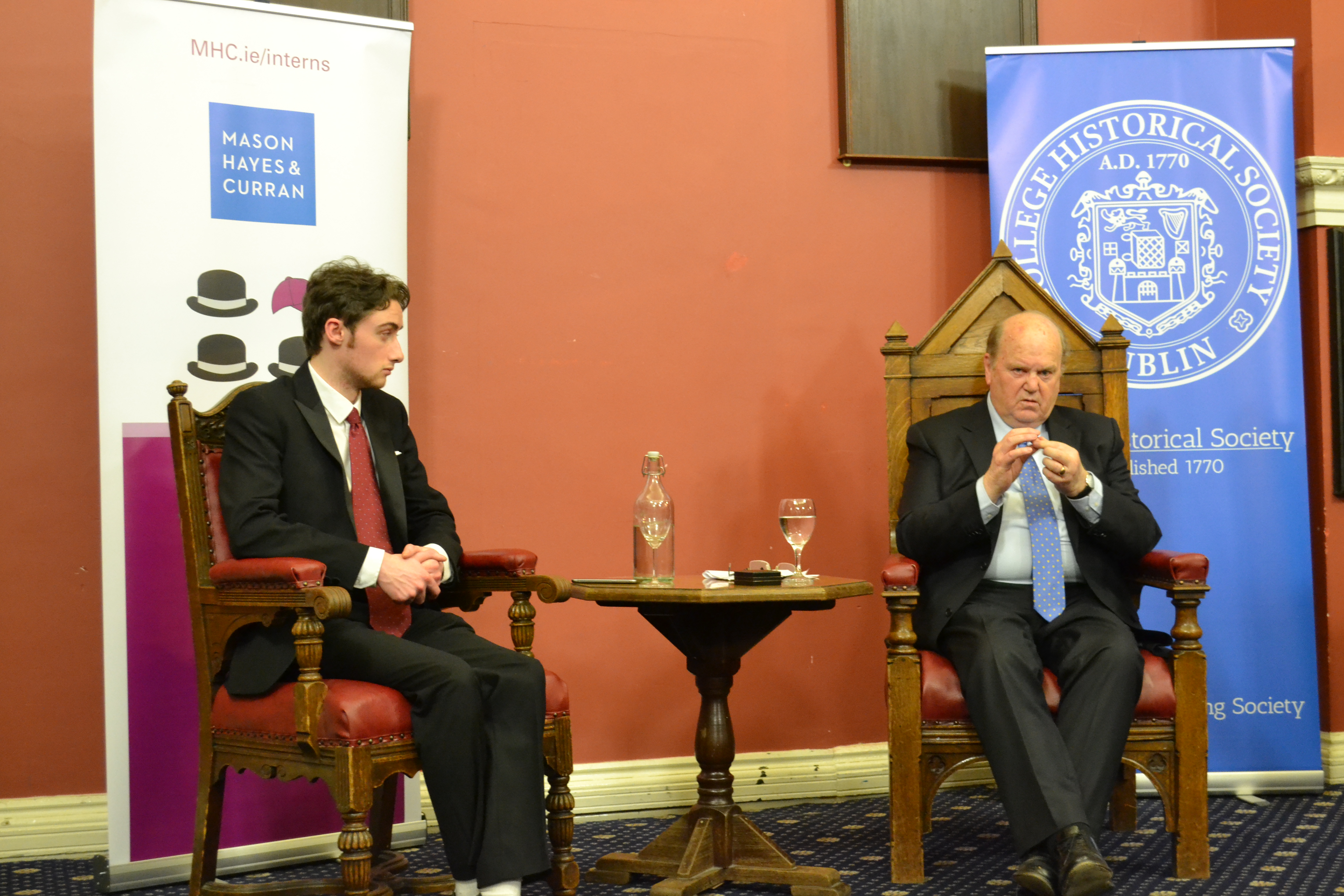Following an effusive round of applause and cordial hand-shake with Paul Molloy, the Hist’s Auditor, the former Minister for Finance sat down earnestly upon the opulent wooden throne of the GMB’s Debating Chamber. Forty-six years a political campaigner and thirty-seven years of major political influence in Dáil Éireann, Michael Noonan is undoubtedly one of the most iconic figures within Irish politics of the late 20th and early 21st century.
Originally studying Primary School teaching at St. Patrick’s College before completing a H.Dip. in English and Economics at UCD, it was not until 1981 that Noonan first entered the Dáil as the Teachta Dála for Limerick East. Since then the TD has a led a distinctly accomplished political life, leading Fine Gael from 2001 until 2002 and taking on four different cabinet ministerial roles in the broad-ranging sectors of energy, industry and commerce, health and most recently, finance.
This year, the College Historical Society recognised Noonan as the worthy recipient of the annual Gold Medal for Outstanding Contribution to Public Discourse, rewarding all he has achieved over the period that his political life has spanned. The most notable achievement over this period was, perhaps, his resoundingly successful six-year post as Minister for Finance.
In 2011, when Noonan first stepped into the role, the Irish economy was still very much in a tumultuous state- a result of the global financial crisis of 2008. Yet Noonan’s astute dealings and prudent policies ensured Ireland’s economic growth and entry back into the global markets. As of June 2017, Noonan is retired from this role and is currently Limerick City’s constituent TD. But he has announced his intended complete retirement from politics from the start of the next general election.
Being presented an award that recognised these soon-to-end decades of political success, Noonan expressed genuine gratitude to the Hist for their acknowledgment of him as a recipient of the Medal. Noonan proceeded to recount his years as Finance Minister. As the TD spoke, it became clear just how dire the financial situation had been prior to 2011 and only now did I understand the enormity of Noonan’s political achievements.
The banks had plummeted from a state of bottomless lending to one where they could no longer borrow from the markets and essentially, became bankrupt. This produced a global knock-on effect and economic damage in Ireland that, in Noonan’s words, “could not be corrected overnight”.
The Fine Gael politician explained his success in rendering the situation, employing the lingo of Economics such as “bilateral loans”, “fiscal policy” and “IMF”. Any Economics students amongst the audience I am sure were unfazed by these technical terms whilst others were perhaps slightly bamboozled. Noonan asserted that the economy has now reached a state of 3.5% annual growth and employment figures are rapidly approaching those of the Celtic Tiger period. Yet he did warn that despite the seemingly positive economic situation in Ireland, caution must be taken in the future in order to prevent another economic crisis.
The politician contended that “the budget should be balanced as a general rule”, that it is necessary to “build up a fund” in case of another financial crash and that there must be “more competitive banking” in Ireland to ensure that sufficient capital investment is available. According to Noonan, these are three of the most important measures to be taken if Ireland is to ensure a stable economy.
In an era of political and economic instability, pervaded constantly by a menacing threat to global safety, Noonan expressed positivity that we will “get the best deal possible” from Brexit and that our “small island on the North Atlantic” is, on a global level, “in a good [political and economic] position”. Noonan concluded his speech with a statement that aroused a sense of both optimism and dread, saying, “Ireland, and the whole of Europe, carries its future in its own hands”.







